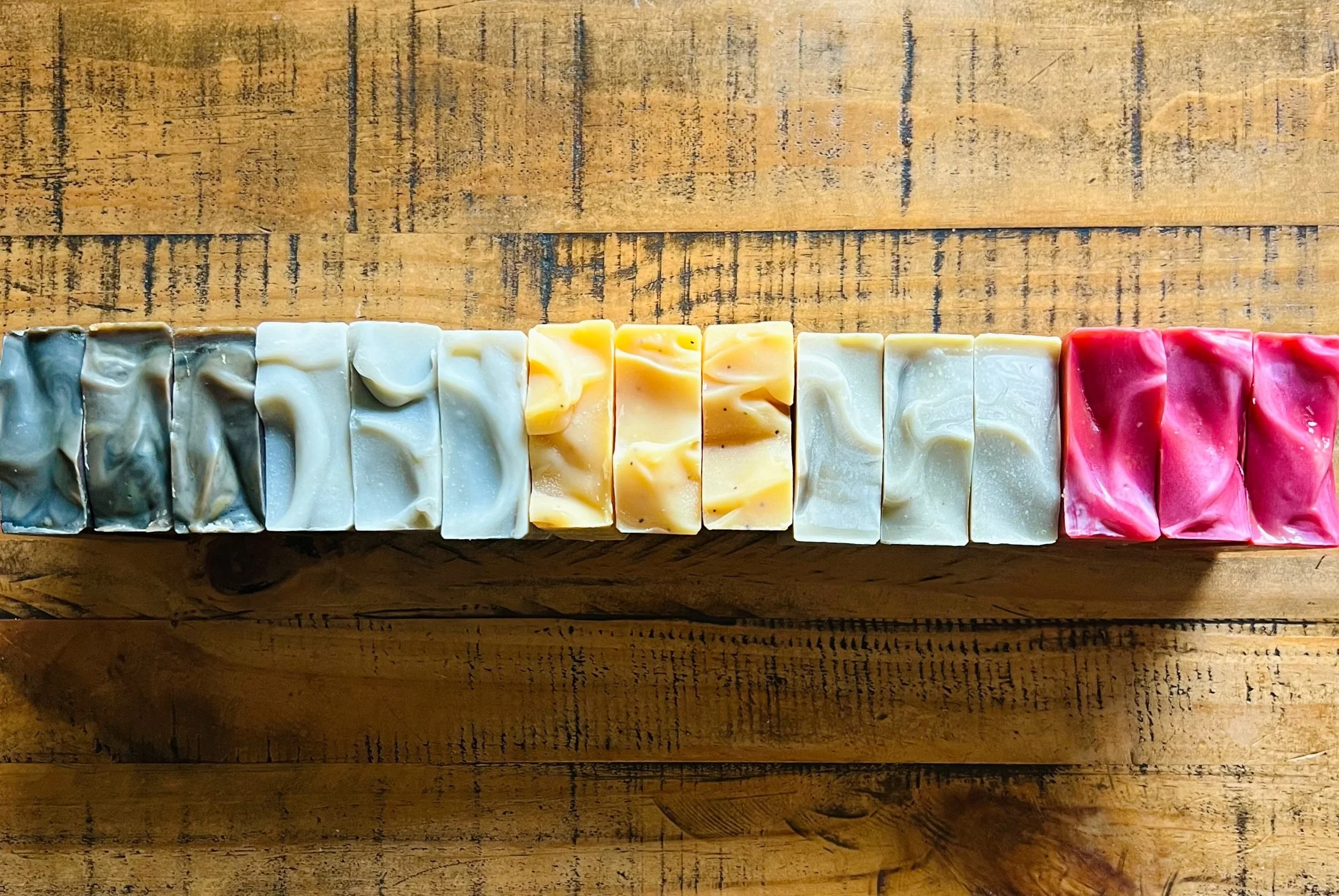5 Reasons Why Handmade Soap Is Better For You to Use
If you were to grab a bottle of store-bought body wash from your shower, can you pronounce the ingredients on the label? Do you know what those ingredients are? If the answers to these questions are no, you are not alone. As skincare consumers, we are becoming more and more aware of what is in the products we use, so it comes as no surprise that many of us are either beginning to make our own skincare products or switching to trusted handmade products with ingredients lists we can understand allowing us to have more control over what goes on our bodies. Here are five reasons why everyone should choose handmade soap over most store bought soap products.
1. Most handmade soaps have much simpler ingredient lists
Handmade soaps are typically made with 3 main ingredients: oils, water and lye (also known as sodium or potassium hydroxide). Some may ask, “How is a caustic substance like lye safe to use on the skin?” and the answer to this is simple: it’s no longer lye once combined with oils. Through a process called saponification, oils and lye solution (lye + water) make up an entirely new substance called - yep, you guessed it - soap! So what about the many beautiful colors added to soap? Handmade soaps are oftentimes colored using a variety of natural colorants such as activated charcoal, clays, spices and other plant based powders like spirulina, indigo, cocoa and more. Other times, soaps can be colored with safe-to-use lab-created micas and pigments. To learn more about the safety of micas, click here. Lastly, to make the soap smell wonderful, many handmade soaps have essential oils and/or fragrance oils in them - both of which, when used in regulated amounts, are perfectly safe.
2. Brand-name soap oftentimes isn’t actually soap - it’s detergent
Yes, you read that right. If your soap product doesn’t have the word “soap” listed on the label, there is a good chance it isn’t actually soap. In order for a soap to be classified as a true soap, it has to mainly be composed of alkali salts of fatty acids, which is the product of saponification. The FDA has a great explanation of soap versus detergent here. Remember that long list of weird ingredients you cannot pronounce to save your life? That is more than likely a laundry list of chemical detergents, and the truth is if you don’t know what these ingredients are, how can you be sure they are safe to use? Some people prefer detergents over true soaps because detergents do not react with the hard minerals in water, which can sometimes cause soap build up in the tub. While a small inconvenience having to scrub the tub once in a while to remove this build up, many people still prefer natural handmade soaps over store-bought detergents because they aren’t filled with a fraction of the chemicals found in the latter.
3. Handmade soap contains glycerin, an incredibly beneficial ingredient to the skin
Glycerin is a wonderful byproduct of soap. It is a natural humectant, which on the skin aids in helping it attract moisture from the air after being cleansed. Ever wonder why your skin may feel driest using brand-name body washes? It’s because usually the glycerin is removed in these types of products. When glycerin is nonexistent in cleansing products, it has incredibly drying effects on the skin. Handmade soaps are usually loaded with glycerin and they cleanse without leaving the skin completely stripped of moisture throughout the day.
4. Handmade soaps are considered natural and are better for the environment
The chemicals found in many body washes/cleansers at the store are not biodegradable because they are made up of synthetic chemicals that can’t be broken down naturally. Since most handmade soaps are mostly made with natural oils and other naturally occurring materials, they are considered biodegradable. Many handmade soaps are also packaged with eco-friendly materials versus the abundance of products in plastic containers at the grocery store.
5. Handmade soaps can showcase beauty and artistry that just can’t be matched
Ok, so this one isn’t exactly a deal breaker for everyone, but soap makers meticulously craft handmade soaps in small batches ensuring quality control and stunning design elements that are sometimes impossible to replicate. For example, with a handmade bar of soap in particular, you may get a bar that is almost exactly the same as another bar ingredients wise but can vary visually and that is just part of the beauty of being handmade. With all of the different combinations of oils, colorants, fragrances and different textures of the soap, soap makers can quite literally create art with their soap and art is something almost everyone can appreciate.
View or shop our collection of soaps here.

